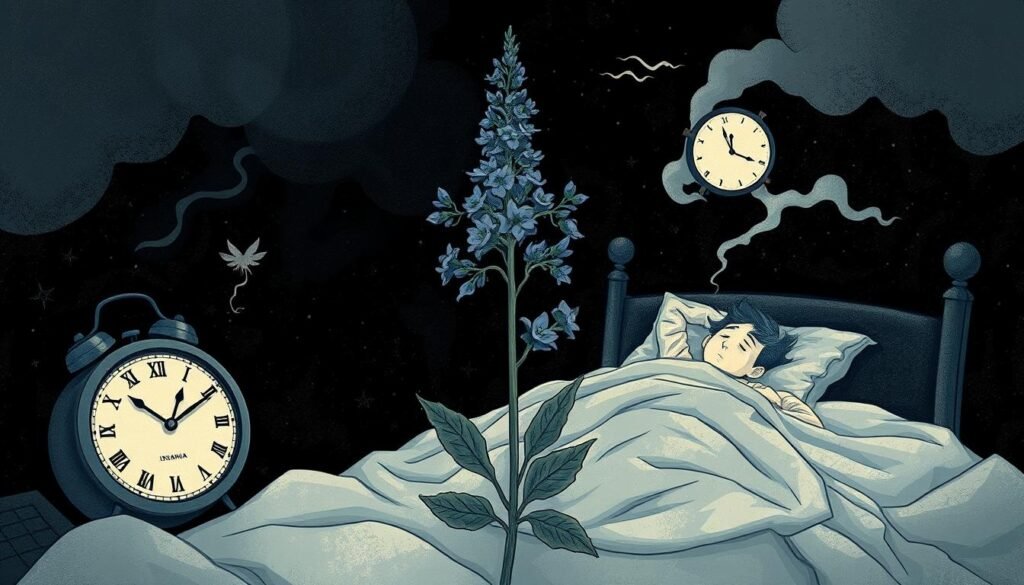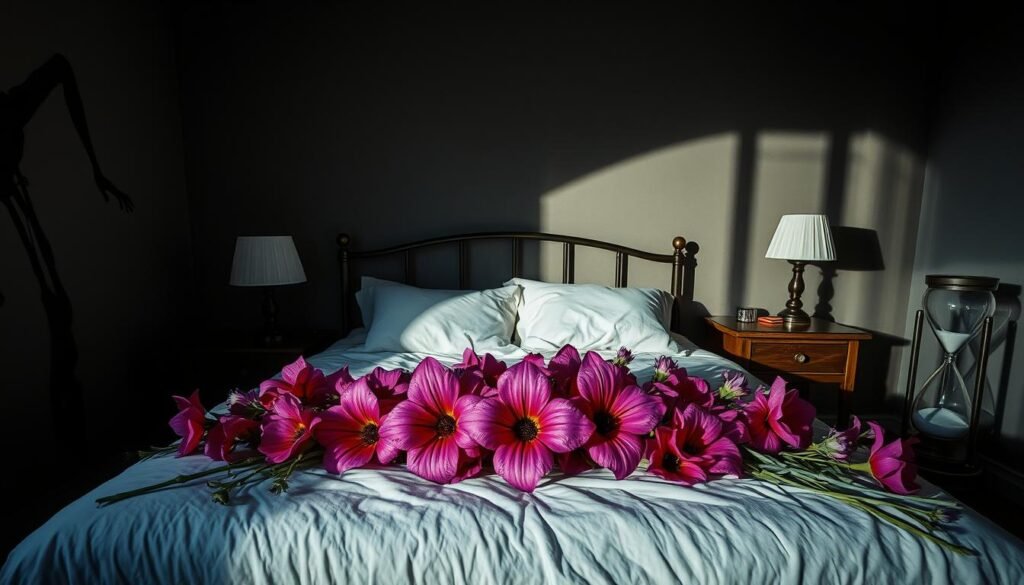Did you know more than 30% of adults in the U.S. have trouble sleeping at some point? This fact points to a big need for ways to fight insomnia. Herbal remedies like valerian root are popular, but they come with questions. People wonder if valerian actually helps with sleep, or if it could make insomnia worse. We’ll look closely at valerian to understand its effects and its role in treating sleep issues.
Valerian root has been valued for its calming effects since the 2nd century A.D. Yet, recent studies make some doubt how well it works and if it’s safe. As herbal remedies become more popular, it’s important to know if valerian helps or harms sleep. Let’s explore the science and stories behind valerian, and what they mean for those seeking a good night’s sleep.
Key Takeaways
- Valerian has been used as a sleep aid since the second century A.D.
- Research offers mixed results on the effectiveness of valerian for insomnia treatment.
- Potential side effects of valerian may include headaches and dizziness, emphasizing the need for caution.
- Consultation with a healthcare professional is recommended before using valerian or any herbal supplements.
- Persistent insomnia may point to deeper psychological or medical issues requiring professional evaluation.
Introduction to Valerian
The valerian plant, known as Valeriana officinalis, is a perennial herb. It is famous for its use as a natural sleep aid. It helps relax and fight off insomnia with its unique smell. Both traditional and modern experts value it for helping with sleep.
What is Valerian?
In the U.S., valerian is sold to help with sleep issues and nervous tension. It works by affecting the brain’s GABAA receptors, which helps it calm. Many people find it helpful for falling asleep faster and sleeping better.
Historical Uses of Valerian
Valerian has been used as medicine since ancient times. Figures like Hippocrates and Galen praised it for treating insomnia and anxiety. Through time, its use as a natural sleep aid has grown, finding a spot in whole health practices. Yet, its effectiveness is still debated, but it’s well-liked worldwide for sleep problems.
| Time Period | Uses of Valerian |
|---|---|
| Ancient Times | Used for treating insomnia, anxiety, and other ailments |
| Middle Ages | Regarded as a valuable herbal remedy for sleep disturbances |
| Modern-Day | Promoted as a natural sleep remedy and nervous tension relief |
How Valerian Works in the Body
Valerian root is known for its calming effects. It’s thought to impact the brain’s GABA levels. GABA is a neurotransmitter that helps regulate nerve activity. This leads to relaxation.
Medications like Xanax and Valium also increase GABA activity. They are used to reduce anxiety and help people sleep. Though similar effects are suggested for valerian, scientists are still exploring how it works.
Effects on GABA Levels
Valerian’s interaction with GABA might help with sleep disorders. Some people say it improves their sleep. Studies found that 530 mg of valerian root could improve sleep quality.
Another study showed that valerian extract helped participants fall asleep faster. They also had fewer interruptions during the night. This supports valerian’s potential to help with sleep issues.

Valerian root could aid in treating anxiety and chronic insomnia. However, its effectiveness varies among individuals. Some studies, especially on postmenopausal women, show significant sleep improvements.
The effectiveness of valerian may come from its various active compounds. However, it doesn’t work for everyone in managing sleep problems.
For people dealing with insomnia, natural solutions like valerian are worth understanding. Tackling sleep disorders often involves looking at several solutions. You can find in-depth studies from Medical News Today and Biotin Bloom.
Research on Valerian and Sleep Disorders
Valerian plays a big role in managing sleep disorders, but research gives mixed reviews. Some studies show it helps with insomnia. Yet, the evidence is not always clear.
Clinical Studies Overview
A lot of studies focus on how valerian extract can help with sleep problems. About 30% to 40% of adults around the world have trouble sleeping. In the elderly, up to 25% have serious sleep issues.
In primary care, up to 69% of patients report insomnia. Around 40% of adults try over-the-counter drugs or alcohol for sleep. But it’s not clear if traditional meds are effective.
| Study Focus | Participants | Valerian Dosage (mg/day) | Key Findings |
|---|---|---|---|
| Valerian’s impact on insomnia | 2 million adults (US) | 225 to 1215 | Mixed outcomes; 6 studies showed significant benefits for sleep quality |
| Quality of research | Various | N/A | Average study quality rated 3.4 on a scale of 0-5 |
| Side effects of valerian | Participant groups | N/A | Common side effects included headache, upset stomach, and drowsiness |
Effectiveness for Insomnia Treatment
Studies on valerian root for insomnia have diverse results. Long-term use might work better than short-term. It can make the quality of sleep better and help you fall asleep faster.
However, not everyone will notice a big difference. It tends to have fewer side effects than other sleep meds. Still, headaches and dry mouth are common side effects. This is important for those on other meds.

Valerian Causes Insomnia – Understanding the Debate
Many people talk about valerian’s role in getting better sleep. Some find it helpful, while others do not see much benefit or face side effects. This mixed feedback sparks debate on if valerian can actually lead to insomnia in some cases.
Conflicting Evidence on Efficacy
Studies on valerian root show varied outcomes. Some research highlights better sleep quality, but other studies disagree. This difference in findings makes people wonder about its real effect as a sleep aid. Moreover, the American Academy of Sleep Medicine does not recommend valerian for ongoing sleep problems. This adds to the doubts about its usefulness.
Possible Side Effects Leading to Insomnia
Before using valerian, it’s important to know about possible side effects. Issues like headaches, dizziness, and upset stomach can impact how well you sleep. In fact, some folks feel more anxious or restless after taking it, which can disturb sleep. Also, valerian may not mix well with other drugs. This risk underlines the need to talk to a doctor before trying valerian.

Common Preparations of Valerian
Valerian root comes in many forms. You can find it as dried roots for making tea, as tinctures, capsules, or in powder form. This variety lets everyone pick what suits them best.
Forms and Dosages
Standardized extracts have around 0.3% to 0.8% of active ingredients. To help with sleep, take 300 to 600 milligrams 30 minutes to two hours before bed. If you’re dealing with anxiety, try 120 to 200 milligrams three times a day.
The last dose should be before you go to sleep. Remember, valerian root might need some time to work. Sometimes, you have to use it for weeks to see the benefits.
Combination with Other Herbal Supplements
Valerian often gets combined with herbs like hops and lemon balm. These enhance its calming effect. This mix can help more with sleep and easing anxiety.
But be careful with such combinations. Always know the possible side effects of valerian root. It’s a good idea to talk with a healthcare provider, especially if you’re using other supplements or medications. To learn more about valerian and its uses, check out this informative article.
Valerian Root Side Effects
Valerian root helps with sleep, but it has risks. People looking for natural sleep help should know about its side effects. It’s vital to understand the adverse reactions some have reported. This can make one wonder if it’s right for sleep problems.
Potential Risks and Adverse Reactions
The common side effects of valerian root are:
- Drowsiness and dizziness
- Digestive issues like upset stomach and diarrhea
- Dry mouth
- Headaches
- Vivid dreams at high doses
Studies show it may take 2 to 4 months to recover from liver damage caused by valerian. While many see it as a safe sleep aid, the FDA hasn’t approved its medical use. People with certain health issues should be extra careful.
Interactions with Other Medications
Valerian can complicate things if you’re on certain meds. This includes:
- Alcohol
- Barbiturates
- Narcotic pain meds
- Muscle relaxants
- Medications for depression or anxiety
Combining valerian with other sedatives can make you sleepier or more dizzy. It’s crucial to watch your dose and talk to your doctor about any side effects. Make sure you store and throw away valerian supplements correctly. Follow the guidelines to avoid health problems. It’s important to be aware and responsible if you’re thinking about using valerian for insomnia.
| Side Effect | Symptoms | Recommended Action |
|---|---|---|
| Drowsiness | Persistent fatigue or lethargy | Avoid operating heavy machinery |
| Dizziness | Lightheadedness or spinning sensation | Consult with a healthcare provider |
| Digestive Uissues | Diarrhea or nausea | Reduce dosage or discontinue use |
| Headaches | Frequent or severe headaches | Consult with a healthcare provider |
Alternatives to Valerian for Sleep Issues
When valerian isn’t helping improve sleep, many turn to herbal sleep aids. People look for natural remedies to ease insomnia without the side effects of valerian. These herbal options offer different levels of safety and effectiveness. Let’s take a closer look at them.
Exploring Other Herbal Sleep Aids
Some herbal remedies are known to help with sleep. These include:
- Chamomile: It has calming effects. Studies show taking 200 milligrams of chamomile extract daily for 28 days improves sleep, especially in the elderly.
- Passionflower: This herb helps with sleep disorders and lowers anxiety, leading to better rest.
- Kava: It can promote relaxation, but be careful. Too much can harm your liver.
- Lemon Balm: Taking 300 milligrams twice daily for 15 days may help with insomnia and anxiety.
Benefits of Melatonin Alternatives
Melatonin is known for setting sleep cycles. About two-thirds of Americans have tried it for sleep issues. Studies say it helps shift workers sleep better. This makes it a good choice for those with irregular schedules. Other alternatives worth considering include:
| Supplement | Dosage | Effectiveness |
|---|---|---|
| Glycine | Up to 30 grams daily | Improves sleep quality and reduces daytime sleepiness |
| L-Theanine | Varies | May reduce nighttime awakenings |
| Magnesium | Varies | Potential benefits for older adults with insomnia |
| CBD and THC | Varies | Can help with falling asleep and staying asleep |
Trying natural sleep aids could be a good move for your sleep issues. Always talk to a doctor before you start a new herbal or melatonin substitute. For details on effective sleep therapies, see alternative therapies for insomnia.
Personal Experiences with Valerian
People share their stories about using valerian for sleep. Many find this herb helpful, improving their fight against insomnia treatment. They talk about better sleep onset and quality. Success comes from combining valerian with a healthy lifestyle.
However, not everyone is happy. Some say valerian causes insomnia or increases their anxiety. This shows how herbal remedies work differently for everyone. It’s important to check if it’s right for you before starting it.
Testimonials from Users
“After trying valerian for several weeks, I finally experienced a restful night. It transformed my sleep routine.”
“I wanted to give valerian a chance, but it made my sleep worse and left me feeling anxious!”
Stories like these show how valerian root affects people in different ways. It’s wise to talk to a healthcare pro before using this herbal supplement for insomnia. Everyone reacts to valerian root differently. Knowing what works for you is key.
| User Experience | Outcome |
|---|---|
| Long-term user | Improved sleep quality |
| New user | Increased anxiety |
| Casual user | Mixed results |
Conclusion
Valerian is an interesting remedy for sleep troubles, mixing pros and cons. People like its calming effects, which might help sleep. This happens because of how it works with GABA in the brain. Still, because the FDA doesn’t keep a close eye on supplements, valerian products can be hit or miss.
Recent research supports valerian root for better sleep, especially for certain folks like those on dialysis. But, it’s not perfect. It might lead to headaches, dizziness, or strange dreams. So, talking to a doctor before starting valerian is smart, especially if you’re already taking other meds.
To wrap up, valerian root could be a good natural choice for sleep problems, but proceed with care. Everyone reacts differently, and knowing the possible downsides is key. Making safe and effective choices is important for good sleep health.